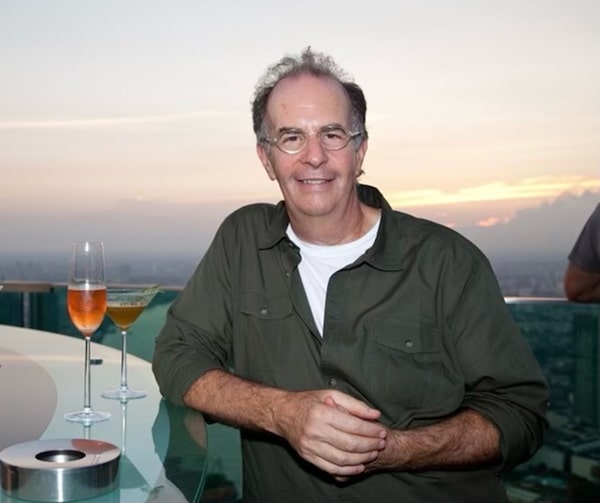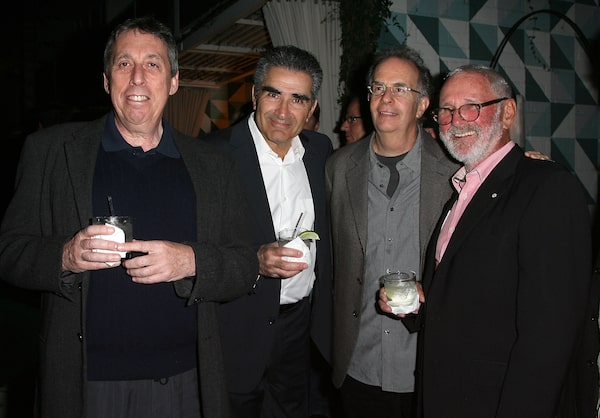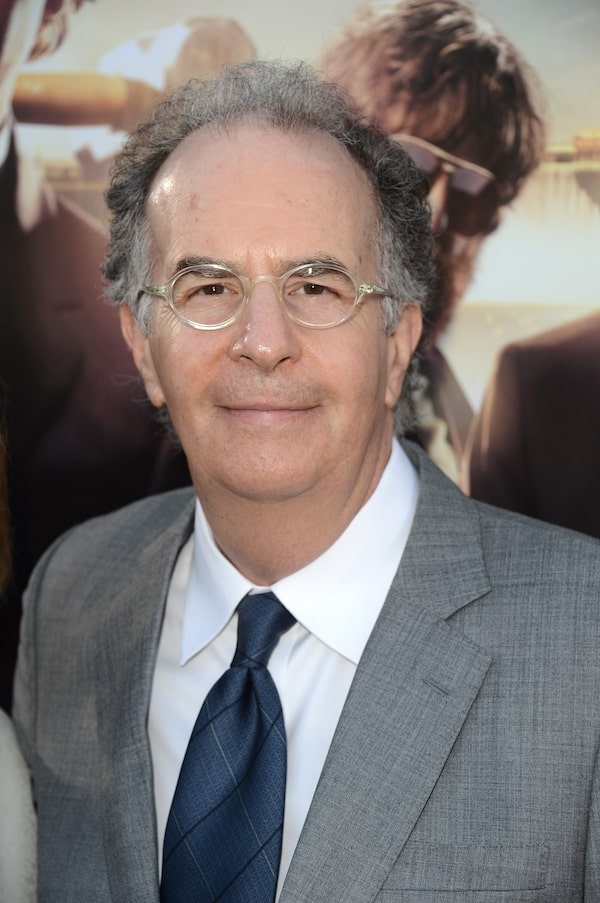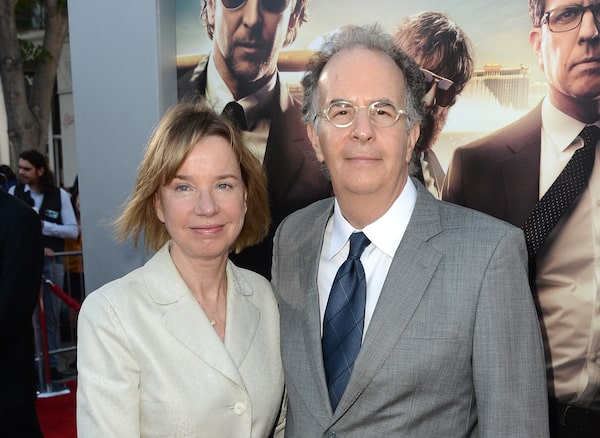
Daniel Goldberg, Hollywood producer, screenwriter died in Los Angeles on July 12 from complications following a routine surgery.Handout
Seeking the co-operation of the U.S. Army before making the 1981 Hollywood war-comedy Stripes, Canadian producer and writer Daniel Goldberg attended a meeting at the Pentagon with a room full of generals. It was explained to the assembled brass that Stripes was to feature misfit enlistees whose Army training would favourably transform them.
“We told them that the American people loved the Army and felt good about the Army, and that we didn’t want to demean the Armed Forces,” recalled the film’s co-writer Len Blum, who also participated in the meeting.
After the presentation, an Army media liaison man told Mr. Goldberg and Mr. Blum that the generals had bought their pitch, inferring that they had succeeded in fooling the officers. But such was not the case, according to Mr. Blum: “We said we were telling the truth, and that we intended to do exactly what we said.”
The film, directed by Canadian Ivan Reitman and starring Bill Murray, was a hit at the box office – it was the fifth most popular film in North America in 1981 – and with the Army. Although heavyweight critics such as Roger Ebert saw Stripes as an anti-establishment “celebration of all that is irreverent, reckless, foolhardy, undisciplined, and occasionally scatological,” the Army approved of the underlying positive message so much that they screened the film for all its incoming recruits.
“We would get royalty statements from them,” Mr. Blum said. “They told us that the Army officially had a sense of humour.”
Stripes was the follow-up to the classic Canadian summer-camp comedy Meatballs, which also starred Mr. Murray and was directed by Mr. Reitman and co-produced and co-written by Mr. Goldberg. Like Stripes, 1979′s Meatballs offered more than just laughs and nuttiness. There was a poignancy to this bawdy film that involved a coarse camp counsellor (played by Mr. Murray) and his mentorship of a camper coming of age (played by Christopher Makepeace).
The bond between the two was the subplot key to the comedy that became what was then the highest-grossing Canadian film ever in North America.
“I think what really, really worked was Bill’s relationship with the kid,” Mr. Goldberg said in 2014. “I think all the scatterbrained and goofy hijinks that occurred in the movie wouldn’t be anything without having that central core that made you care about it.”

Ivan Reitman, Eugene Levy, Daniel Goldberg and Norman Jewison attend Canadian Film Centre Celebrates Their North/South Relationships on March 9, 2011 in Beverly Hills, Cal.Valerie Macon/AFP/Getty Images
Mr. Goldberg, associated with other Hollywood comedies including Space Jam, Private Parts, Old School and the Todd Phillips-directed Hangover trilogy, died in Los Angeles on July 12, owing to complications following a routine surgery. He was 74.
If the romping, commercially successful comedies he contributed to have a pleasantness to them, Mr. Goldberg may well have been the source. “He was the sweetest and most gentle soul you could ever encounter,” said comedic actor Eugene Levy, who came out of the same film scene at Hamilton’s McMaster University in the late 1960s as Mr. Goldberg, Mr. Reitman, Martin Short, and, later, Mr. Blum.
Often working in the tall shadow of the late Mr. Reitman, Mr. Goldberg was a quick-witted writer and an even-keeled producer who fixed problems and capably assembled film crews. “He understood process,” said Mr. Blum. “Ivan understood how to get a movie made, but Danny understood how to make a movie. They are two different things.”
Mr. Reitman and Hamilton native Mr. Goldberg met in 1966 at McMaster, where both were members of the McMaster Film Board (MFB), a student-run club that screened films on campus and produced short films of its own. Although Mr. Goldberg starred as a hapless new student in Mr. Reitman’s first-ever film, the 1968 MFB short Orientation, he wasn’t an actor by nature.
“I’m sure Ivan picked him because he looked like a nerdy guy who was going to make a lot of mistakes,” Mr. Levy said.
In 1969, Mr. Goldberg and Mr. Reitman came under public scrutiny for The Columbus of Sex, a 95-minute movie that they made on a $3,000 budget, and which was the first Canadian film to be tested in the courts for obscenity. “The subject matter and dominant characteristic of the film is sex, sex and more sex, fortified by the narration,” Wentworth County Judge Theodore McCombs said in his 1970 ruling.

Producer Daniel Goldberg arrives at the premiere of Warner Bros. Pictures' "Hangover Part 3" on May 20, 2013 in Westwood, Cal.Kevin Winter/AFP/Getty Images
Convicted of possessing, making, printing and publishing an obscene film, Mr. Goldberg and Mr. Reitman were placed on one year probation. The judge said he had suspended sentencing because the two defendants would be conscious of the conviction and govern their future film efforts accordingly.
Their next film was 1973′s Cannibal Girls, a sexy, stab-happy horror-comedy starring Mr. Levy and Andrea Martin. In an attempt not to offend or horrify those in the audience of a squeamish or prudish disposition, the sound of a bell served as a warning for them to close their eyes or turn away to avoid seeing scenes of an erotic or gruesome nature.
In 1985, Mr. Goldberg and wife of three years moved to Los Angeles. British Columbia native Ilona Herzberg was a producer on films including Evan Almighty, Waterworld, Neil Young: Heart of Gold and Feds, a 1988 comedy that starred Rebecca De Mornay and Mary Gross. It was the only feature Mr. Goldberg directed in Hollywood and the only one the couple worked on together.
He had a reputation for giving people their first opportunities in film, advancing their careers and fighting for their on-screen credits. He read countless scripts by fledgling writers, provided extensive notes and watched many a first cut with both established and young filmmakers.
“He always said ‘yes,’” said Ms. Herzberg.
Although Mr. Goldberg was known for his work on the big screen, he briefly toiled as a film editor and producer with the new Toronto television station CITY-TV in the 1970s. In 1996, he received an Emmy Award nomination as co-executive producer on the 1996 HBO film The Late Shift, which portrayed the high-stakes late-night-television manoeuvring of Jay Leno and David Letterman.
As a writer, Mr. Goldberg preferred to “jam” scenes with other writers, according to frequent collaborator Mr. Blum. “If either one of us said something funny, I’d write it down.”
Stripes was written by Mr. Blum, Mr. Goldberg and Harold Ramis during the Iran hostage crisis, in which 52 U.S. diplomats and citizens were taken captive by militarized Iranian college students in 1979. The Americans were still not free when the movie – with a climactic scene involving a rescue mission of U.S. soldiers held in the former Czechoslovakia – was screened to preview audiences in the United States.
“They were standing on their chairs cheering,” Mr. Blum said.
The film galvanized an American audience at a time when the preferences of baby boomers dominated pop culture trends and tastes. By the time the Goldberg co-produced comedy The Hangover hit screens in 2009, audiences had fragmented. And, yet, the wild bromance starring Bradley Cooper was a whopping success.

Producer Daniel Goldberg (R) and Ilona Herzberg arrive at the premiere of Warner Bros. Pictures' "Hangover Part 3" on May 20, 2013 in Westwood, Cal.Kevin Winter/AFP/Getty Images
“Danny was thrilled with the first Hangover,” Mr. Blum said, “because it got the same kind of universal reaction as Stripes.”
Beyond the comedies he was known for, Mr. Goldberg wrote and/or produced such films as Heavy Metal, Spacehunter: Adventures in the Forbidden Zone, Six Days Seven Nights, Evolution and Killing Me Softly. He was a genuinely funny, kind man at heart however, who felt strongly about the sweetness behind humorous stories.
“I think people misinterpret comedies as having to be harsh in order to be funny,” Mr. Goldberg told Playback magazine in 2014. “If you look at the best comedies, you care about the people, you care about their struggle, you care about what they have to do and therefore it frees you up to laugh.”
Daniel Mitchell Goldberg was born in Hamilton on March 7, 1949. He was one of four children born to Irwin Goldberg and Audrey Goldberg (née Shabell).
His mother was a painter and sculptor who spent her formative years in New York, where she attended the Parsons School of Design. His father, who studied at the Massachusetts Institute of Technology, helped build the first turbojet engine as part of Frank Whittle’s team in England.
Ironically, given the boy’s future in the film business, the family lived on Hollywood Street in Hamilton.
As a teenager in the Beatles-crazed 1960s, Mr. Goldberg was a talented drummer. His first serious band was the Hawthornes, who specialized in Beach Boys’ material. Young Mr. Goldberg handled the deep-voiced “I’m picking up good vibrations” vocal part in their version of the sunny 1966 hit.
His younger friend Mr. Blum played guitar in the Hawthornes (named after the Beach Boys’ Southern California hometown). The two of them had squeezed a drum kit, guitar and amplifier into a Volkswagen Beetle owned by Mr. Goldberg’s mother to audition for the group after seeing a classified ad in the Hamilton Spectator.
“We were a really good band, but the problem was that nobody in working-class Hamilton wanted to hear the Beach Boys,” said Mr. Blum. “They wanted to hear music by Wilson Pickett and James Brown, and when we would play California Girls, beautifully, we had chairs thrown at us.”
At McMaster, Mr. Goldberg and the older Mr. Reitman were devoted cinephiles. “If you went to a film with them, you would go into the theatre to get the best seats, normally close to the front,” recalled Mr. Levy. “You didn’t utter a word until the film was finished. That was the etiquette of movie-watching with them.”
In a tribute published on the news website Deadline Hollywood following Mr. Goldberg’s death, Jason Reitman (the filmmaking son of Ivan Reitman) described the duo as “two Jewish kids with equally floppy hair who could convince their college buddies to stay up all night making a movie instead of studying for finals.”
For a short while in the 1970s, Mr. Goldberg and Mr. Blum produced records in Toronto. After his stint at CITY-TV (now branded Citytv), Mr. Goldberg vowed to never again work in television and took up cab driving to make ends meet. “At the end of every month, he would drive nearly 24 hours a day to make rent,” said Dennis Matheson, his roommate and close friend who also worked at CITY-TV.
The making of the breakthrough hit Meatballs at the end of the decade was a nostalgic experience for Mr. Goldberg, who once worked at a summer camp. The movie was filmed at Camp White Pine in Haliburton, Ont.
“There are parts of the movie that, when I see a clip of it, I get teary-eyed,” Mr. Goldberg said 35 years after the film’s release. “When we made it, we all lived together up near Haliburton, we all lived in this community and played volleyball and swam and that stuff. And the movie, it’s just a heart-warming movie. It still affects me in that way.”
He is survived by his wife, Ilona Herzberg; and siblings Kathryn Hogg, Amy Goldberg and Harris Goldberg.
 Brad Wheeler
Brad Wheeler